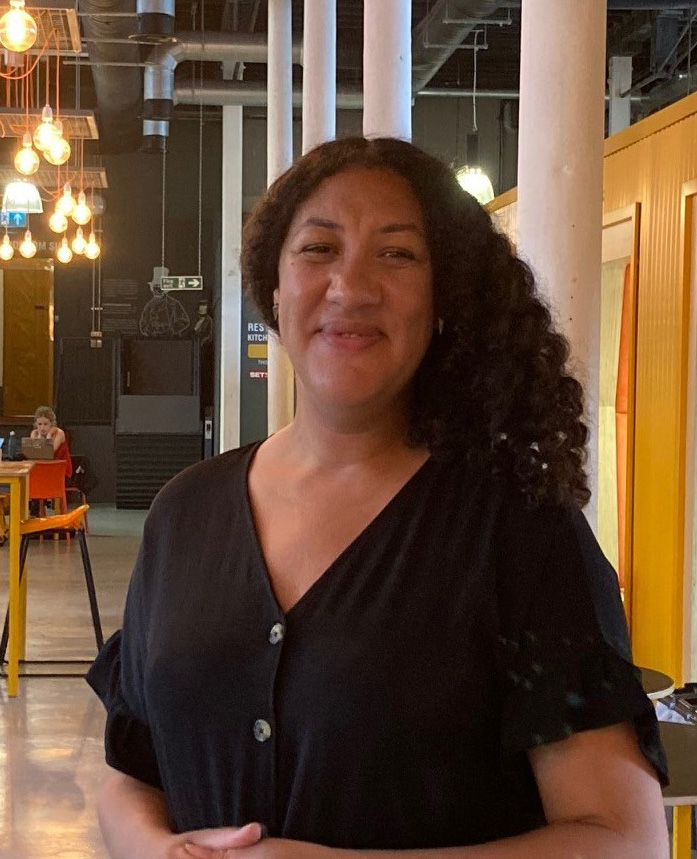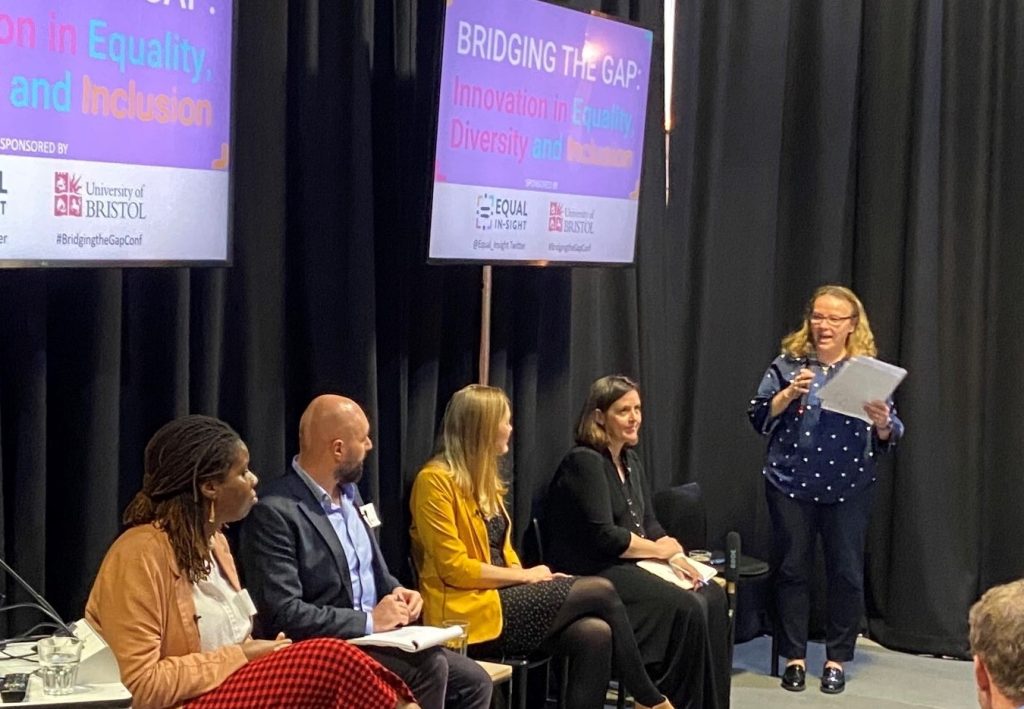 Blog by Emilie Harryman, Engine Shed Partnerships Manager
Blog by Emilie Harryman, Engine Shed Partnerships Manager
Earlier this month the University of Bristol’s School of Sociology, Politics and International Studies and EQUAL In-Sight held an inaugural one-day Bridging the Gap event at Engine Shed, exploring and sharing the latest innovations addressing Equality, Diversity and Inclusion (‘EDI’).
The conference formed two key panels which were developed around emerging concerns in the EDI space, ‘Debunking EDI myths’ and ‘Data and EDI’ and was led and discussed by leading academics and practitioners in this field (see footer for speakers).
With recent reports from the Institute of Fiscal Studies and the Fawcett Society highlighting the significant challenges still prevalent for EDI in the UK, it seemed an opportune time to share some key takeaways and actions from the event. Credit and thanks to the speakers for sharing their candid insights, expertise and experiences working within this area and to EQUAL In-Sight and the University of Bristol for bringing together such a broad range of experts.
Why a diverse workforce matters?
According to keynote speaker Zara Nanu, the positive impact of having and retaining a diverse workforce is well documented, including but not limited to:
- Faster innovation which can result in 19% higher revenues
- Greater market share with 70% of diverse companies more likely to capture new markets
- Profitability: 21% more likely than companies in the 4th quartiles to have above-average profitability
- Talent attraction: 86% of job seekers say diversity is an important factor when considering a potential employer
- And a more equitable post-pandemic recovery leading to a stronger global economy
Recruitment
A lack of diversity in the workforce will continue to have negative impacts for both individual organisations and communities as we struggle to deal with the talent pipeline (or lack thereof) and skills shortages in key strategic areas.
- We need to recognise history has a tangible systemic impact on how the world operates today; women have historically been written out of roles and Black and people of colour have been positioned as subservient. Consider whether this influences who you consider more capable for particular types of roles.
- Build up a community of practice in your hiring operations. Certain protected characteristics need specific interventions and recruiters should already know how they will make the interviewing processes accessible. Additionally, what physical tools should be available in the workplace, screen readers, for example.
Leadership
Diverse organisations are arguably more innovative and sustainable in the long term. Often, the business case for EDI in the boardroom is difficult to advocate for. Cross-business functions are needed to entrench and implement change and leadership and leadership buy-in opens a space for difficult work to take place. Leadership needs to be able to advocate for others by implementing certain approaches:
- Recognise that legislation provides minimum protections. In order to drive an inclusive culture, the organisation must develop approaches to allow the right behaviours to emerge.
- Inclusive leadership needs to learn how to build a culture that retains people from underrepresented backgrounds once they are in the organisation.
- Accountability. EDI isn’t something that happens ‘over there’ in your organisation. It should be embedded, and leaders must make the time to ensure they are engaged with it.
- Reflect and examine who your product or service advantages and who it disadvantages. Do current business models recreate the injustices or inequalities you are trying to challenge?
Allyship
Allyship is interpreted differently by different people, with the term meaning different things in different contexts. Being an Ally is something that needs to be carefully considered so that it does not simply serve as a virtue signalling exercise. It is critical that there is a balance between good allyship, and marginalised and minoritised people being given the space to speak for themselves. Being aware of your own privileges and considering colleagues who may have both visible and invisible barriers to the spaces you can exist and move freely in can help to inform how you act and enable space for ‘proper’ representation:
- Consider who is being privileged and advantaged within your structure.
- Set your own personal ambitions and objectives, for example developing you own understanding of the intersections between two or more protected characteristics, get to know people who are different from you and standing up for what is right
- Be brave and undertake new learning
- Know your impact and the changes you can make in your communities
- Allyship doesn’t need to be shouted about. The quiet reflective work is equally, if not more valuable to your employees than bells and whistles.
Data
Data and metrics can be powerful tool when looking at impact and can be useful to prove the problem exists and can empower teams to prioritise meaningful goals, leading ideally to good decision-making. However, it’s important to recognise that data does not have neutrality and the questions you ask can influence the results you get out and by only asking the questions you are interested in feeds your own narrative.
- Data is not always used to highlight the areas in which EDI approaches might be failing. Good data can show you know where the bias exists and provide a framework within which to make informed changes.
- Be mindful that a diverse team does not equal a happy team and it does not mean the work is your EDI strategy is complete. Are there ways in which you can measure an inclusive culture in order to combat churn rate?
- Consider safeguarding in the context of EDI. It’s important to be conscious of the unintended consequences and harm of collecting data and the work that is undertaken in this area needs to be done so respectfully.
Engine Shed and EDI
At Engine Shed, creating a positive impact in our communities and within our ecosystem remains at the heart of what we do. Our residents run businesses that share inclusive values, we offer partner memberships to organisations whose work aims to benefit and build the local ecosystem, and, alongside our partner tech incubator SETsquared Bristol, we run a number of initiatives to promote diversity and inclusion including our recent Ada Lovelace Day – Inspiring Girls and Women in STEM event.
Our recently launched Community Partnership seeks to support wider access by community companies to our Engine Shed ecosystem via corporate sponsorship. The community partner will benefit from Lounge Membership and networking opportunities with relevant individ
uals and organisations and our inaugural partners will be announced soon.
And finally, after a brief hiatus caused by the pandemic, we will be reinvigorating our schools skills programme for 2023.
If you are interested in becoming a Community Partner sponsor or partnering with us to help deliver some impactful skills and training, please get in touch with emilie.harryman@engine-shed.co.uk.
Speakers at this event:
Prof Judith Squires, University of Bristol Deputy Vice-Chancellor and Provost, opened the event.
‘Debunking EDI myths’ was chaired by Sangeetha Wynter from Babbasa, and included Nero Ughwujabo, Busayo Abidakun, Sirayah-Shiraz Koraltan and Rosalind Cavaghan.
‘Data and EDI’ was chaired by Prof Roberta Guerrina, project lead for EQUAL In-Sight. Speakers in this section included Anne-Laure Humbert, Joyann Boyce, Pete Ward and Scarlett Brown.
The keynote was delivered by Zara Nanu MBE, CEO at Gapsquare
About EQUAL-Insight
Equal Insight is a new project at the University of Bristol looking at systemic ways to address issues of Equality, Diversity and Inclusion. The project works with external partners to develop tools to analyze barriers within organisations and is currently working on a pilot tool to diversify recruitment candidate pools. As part of their work, they are developing a community of practice to address the needs and listen to the perspectives of many different sectors. If you would like to talk to them about their work, are interested in partnering with them on a pilot project, or would like to be part of the CoP please get in contact with the Equal Insight team. @EQUAL_Insight
